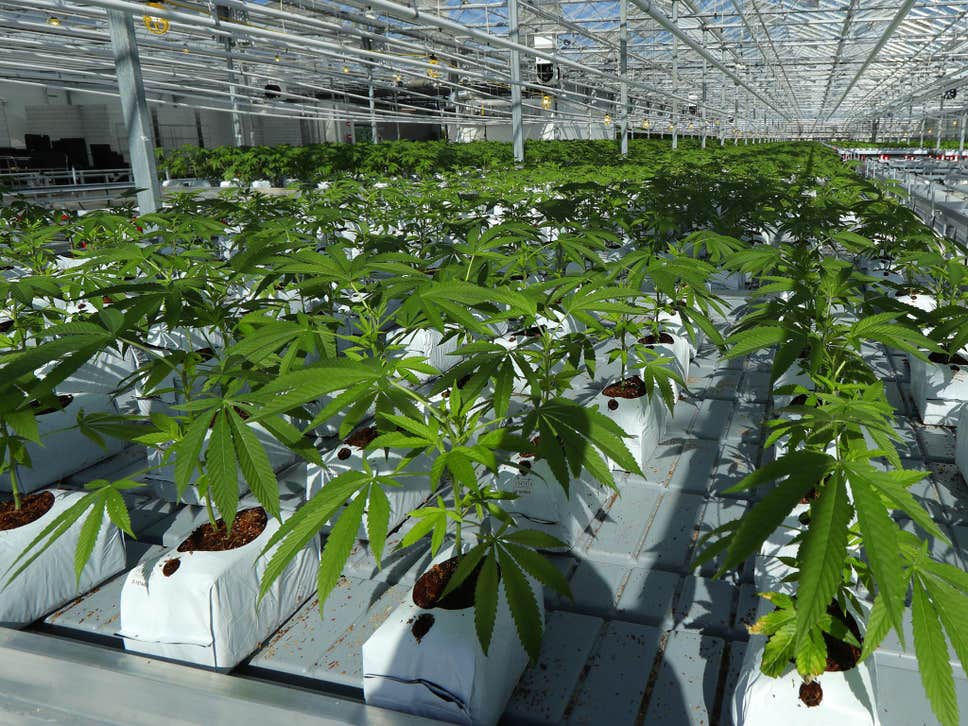You are here
Home 🌿 Marijuana Business News 🌿 Budding economy: How indigenous peoples are cashing in on Canada’s cannabis boom 🌿Budding economy: How indigenous peoples are cashing in on Canada’s cannabis boom

The biggest hub is the tiny Mohawk territory of Tyendinaga, about two hours east of Toronto.
On a speck of land three miles wide and 12 miles deep, there are more than 60 cannabis dispensaries selling all manner of products – from pot to THC sweets.
Robert Tehonikonrathe, also known as Fisher, says his people have been wheeler-dealers for centuries. His son owns the Healing Shoppe/Pot Shoppe/Bear Medicine dispensary.
“We’re the most capitalistic people in the world,” he tells The Independent.
Besides cannabis, the indigenous Mohawks also control a billion-dollar gasoline trade on the territory and also control much of Ontario’s tobacco industry.
And when Canada legalised cannabis on 17 October 2018, the seeds of the industry had already been planted in the community.
While the government has set strict regulations on cannabis commerce, it doesn’t have any impact on the Mohawks of the Bay of Quinte, who set their own laws.
On a stretch of Highway 2, the landscape is speckled with roadside signs offering specials and incentives. But Tyendinaga is not your typical reserve.
The Mohawks of the Bay of Quinte never ceded their territory to the British crown, and as sovereign people have figured out the cannabis business better than the Canadian government has managed thus far.
“Those guys [the Canadian government] would just screw everything up here,” Tehonikonrathe says.
The territory has around 4,000 residents and many are involved in the legal cannabis trade that has triggered a building boom.
Canada’s tiny Mohawk territory of Tyendinaga is benefitting hugely from the cannabis business (Brad Hunter/The Independent)
The dispensaries have any array of names, like Best Buds, Pot Shoppe, B’Leaf, L’Eagle Dreams, Smoke on the Water, and Legacy 420.
Outside the stores – some bricks and mortar, others converted trailers or mobile homes – is an American shock attack of the silent salesman, aka roadside signs.
Signs offering $12 (£9) THC slushies, deals on grams, customer reward cards, and specials on an arsenal of pot-smoking paraphernalia.
Outside the scores of dispensaries, everything from BMWs, vintage MGs to SUVs, pickup trucks and Toyota Camrys line the parking lots. Some of the stores even offer drive-throughs providing coffee, pizzas and 24/7 service.
On display at the CannaKure dispensary, strains like Sour Patch Kids and Bruce Banner entice a wide array of customers on a recent afternoon.
Jay Quelyn – who like a lot of others in the weed trade doesn’t want her real name or picture out there – is a “bud girl”.
She will roll your joints, chat with you, and even steer you in the right direction to suit your mood.
“This has brought a lot of money into the community” she says.
But while governments have struggled to understand how to navigate the cannabis industry, the Mohawks have it nailed down.
Government dispensaries run out of product and are too expensive, critics have said. As much as $10 per gram more expensive.
“I would suggest rather than telling us what to do they should be asking us what to do,” Tehonikonrathe says.
“Canada is our friend, you are always welcome here, but remember, it is our territory and we are a sovereign people.”

Signs offer special deals and incentives on cannabis goods (Brad Hunter/The Independent)
He adds: “All we’ve ever wanted is for the government to leave us alone. That’s it.”
According to dispensary owners and other locals, the police merely make courtesy calls to share information, to warn of robberies, or just pop by for a cup of coffee.
Tyendinaga Mohawk police chief Jason Brant said last October that with just seven constables policing the dispensaries would be impossible.
The first gas station on the territory opened in the early 1970s and because there was no tax – much to the government’s chagrin – the business exploded.
In the 1990s, the tobacco business also blossomed in Tyendinaga.
“There is more happening here than at any other time in history,” Tehonikonrathe says.“Anyone who wants a job, has a job. Construction is booming. The social aspects have been tremendous. Families are closer. Our people don’t have to drive an hour or two to work anymore so they’re home for supper.”
“It’s a good business,” says Smoke On the Water dispensary manager Joe, who didn’t want to use his last name.
“There are no hassles, the customers are great. The government... they’re trying to run the cannabis business like the mafia.”
He adds: “There’s zero unemployment here. But the government has put a glass ceiling on all the good it can do. It’s too bad other communities – native and non-native – couldn’t do this.
“Then we’d see what the cannabis business could do for the rest of the country.”
420 Intel is Your Source for Marijuana News
420 Intel Canada is your leading news source for the Canadian cannabis industry. Get the latest updates on Canadian cannabis stocks and developments on how Canada continues to be a major player in the worldwide recreational and medical cannabis industry.
420 Intel Canada is the Canadian Industry news outlet that will keep you updated on how these Canadian developments in recreational and medical marijuana will impact the country and the world. Our commitment is to bring you the most important cannabis news stories from across Canada every day of the week.
Marijuana industry news is a constant endeavor with new developments each day. For marijuana news across the True North, 420 Intel Canada promises to bring you quality, Canadian, cannabis industry news.
You can get 420 Intel news delivered directly to your inbox by signing up for our daily marijuana news, ensuring you’re always kept up to date on the ever-changing cannabis industry. To stay even better informed about marijuana legalization news follow us on Twitter, Facebook and LinkedIn.




